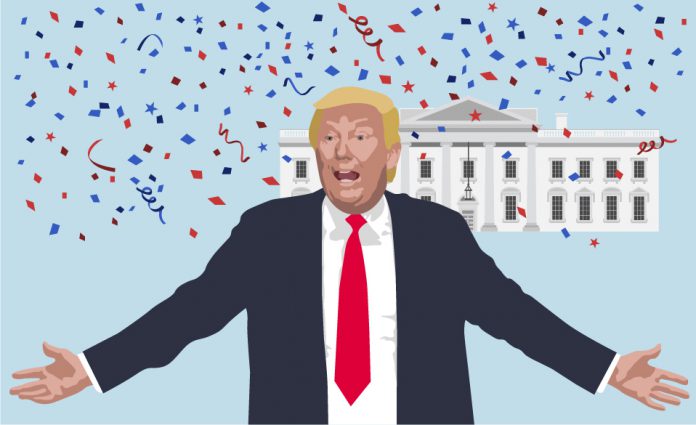Donald Trump’s stance on the economy has been something of a mystery to analysts, citizens and fellow politicians alike. The markets were mixed in response to Donald Trump’s inauguration speech on Friday, after it failed to give much clarity as to his intentions.
The dollar index fell to its lowest point of the day after Trump said he would ‘put America First’, with investors taking this to mean that it he would be taking a protectionist approach to the economy.
Trump himself has given mixed messages. Whilst he was the Republican candidate, he has made several statements that seem at odds with traditional conservative party policies. Trump is arguably more liberal in areas such as government spending, entitlements and infrastructure, but remains true to Republicanism in others, including taxes and regulation.
Fiscal policy
One of the areas Trump has been fairly clear on is his plan for taxes; his traditionally Republican approach to fiscal policy involves cutting taxes in order to stimulate economic growth. As a businessman first and foremost, Trump has made it clear that any plans to cut taxes will extend to corporate tax – prompting arguments from critics that his plan would would balloon the deficit by at least $4 trillion and as much as $6 trillion over 10 years.
Trump has also vowed to increase public spending on infrastructure, borrowing the money to do so whilst rates are low. This approach has always been seen as fairly liberal, rewarding voters with investment in local areas, transport and roads.
However Tom Elliott, International Investment Strategist at independent financial advisor deVere Group, warned investors:
“The type of fiscal stimulus policies that Trump has promised, such as lower taxes and infrastructure spending, can make up for shortfalls in public spending and so stimulate a depressed economy. Yet the US is not suffering from a depressed economy, and inflation may be the result.
“Furthermore, with the U.S government deficit likely to hit its current $20 trillion mark in March, thanks to a continuing large budget deficit (of 3.2 per cent of GDP), the Treasury market may well take fright at the prospect of both oversupply and inflation should Trump try to enact such a policy.”
Monetary policy
Trump has often ridiculed the Federal Reserve, accusing Chair Janet Yellen of keeping interest rates ‘artificially low’ to improve Barack Obama’s record on jobs.
However should Trump’s fiscal policies prompt higher interest rates, he could risk damaging the economy for the average saver – despite winning the election on claims he is a ‘man of the people’. Higher interest rates would mean higher mortgage rates, which could lead housing activity to slow down.
As US growth has historically been influenced by housing activity, any slowdown here could constrain US growth.
Regulation
Trump’s strong stance against excessive regulation is further evidence that his policy is largely propelled by his business instincts. He has spoken out against Dodd-Frank Act on financial reform, the Affordable Care Act and Obama’s clean power plan and sparked criticism by vowing to take the US out of the Paris climate-change accord.
From a businessman’s perspective, deregulation fits his understanding of how economic growth is created: by lowering taxes and cutting regulations, businesses will be free to grow and thus create more jobs.
Debt
Trump’s stance on debt made news when he told the Washington Post that he would “get rid of the $19 trillion” national debt “fairly quickly’ – meaning in around eight years. This sparked alarm from government debt specialists, as well as politicians.
He has since backtracked on this aggressive approach, saying in an interview in April 2016 that he would instead “pay off a percentage of it” in that time, adding that the “most important thing is to make sure the economy stays strong”.
Whether Trump will mellow his controversial policies as he begins his four-year term in office still remains to be seen. However what is certain is that the markets will be in for a bumpy ride in the first 100 days of his presidency, as his intentions come into focus.
DeVere Group’s Tom Elliott concludes: “The clock starts ticking today on President Trump’s first 100 days. If in this period we hear conciliatory words from Trump on his more contentious policy ideas, and evidence that his advisors and Congress can control the impulsive side of the man, Trump may confound his critics and have a successful presidency. Markets will be relieved and the Trump rally on Wall Street will resume.
“Market volatility should be expected over the next 100 days, and the likely turbulence will arise from the uncertainty reflected in the mix of appropriate and inappropriate economic policies Trump wants to introduce.”

